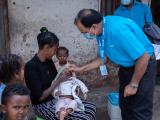Oct 17, 2012
West Nile virus cases and deaths rebound
The tally of newly reported West Nile virus cases and deaths ticked up again in the past week after declining the week before, according to today's update from the Centers for Disease Control and Prevention (CDC). Health departments reported 282 cases and 15 deaths, as compared with 280 cases and 5 deaths a week earlier, the CDC said. The number of West Nile neuroinvasive disease cases, the most serious form of the disease, was 170 for the past week, versus 113 a week earlier. Totals for the year so far are 4,531 cases, including 2,293 neuroinvasive cases, and 183 deaths. The numbers continued to be the highest for this time of year since 2003, the CDC said. Texas, with 1,580 illnesses and 55 deaths, accounted for about 35% of all cases. Other hard-hit states are California, Louisiana, Mississippi, Illinois, South Dakota, Michigan, and Oklahoma.
Researchers share details of first novel coronavirus case
The Saudi Arabian doctor who treated the first patient known to be sickened with a novel coronavirus and Dutch researchers who characterized the virus published a detailed report on their clinical and virologic findings online today in the New England Journal of Medicine (NEJM). The patient, a 60-year-old man, died at a Jeddah hospital on Jun 24 after an 11-day hospitalization for a severe respiratory infection. His acute respiratory distress syndrome and multiorgan dysfunction were similar to severe cases of influenza and SARS (severe acute respiratory syndrome), and his hematologic changes and renal failure also resembled some SARS cases, the report says. Pneumonia symptoms did not improve with antibiotic treatment, and the man received oseltamivir for possible 2009 H1N1 flu infection. Extensive diagnostic testing revealed a coronavirus, and genetic sequencing showed that the virus, called HCoV-EMC, is distinct from previously known coronaviruses and is the sixth known to infect humans. Its closet relatives are two coronaviruses found in two bat species, which suggests that bats could be a reservoir, the group wrote. Although the virus lacks the worrisome hallmarks of SARS, the case is a reminder that some coronaviruses can cause severe infections in humans, the authors said. Serologic studies of 2,400 samples from patients treated at the same Jeddah hospital over the past 2 years found no evidence of antibodies against the new virus, suggesting that it had not been circulating locally. A second patient infected with the same virus remains hospitalized in the United Kingdom.
Oct 17 N Engl J Med abstract
In a related NEJM editorial, two US infectious disease experts wrote that the case fits an increasingly common theme of new pathogens being detected before they develop efficient human-to-human spread, demonstrating the benefits of good communication between the medical, science, and public health communities.
Oct 17 N Engl J Med editorial
Study: Simple measures can cut ICU bloodstream infections
In a study involving 74 intensive care units (ICUs) in 16 states, daily use of antimicrobial soap and an ointment reduced bloodstream infections by 44% and cut the rate of colonization with methicillin-resistant Staphylococcus aureus (MRSA) by 37%, according to a report presented at IDWeek, a joint meeting of four infectious disease societies in San Diego. The researchers assigned ICUs to use 1 of 3 strategies for controlling MRSA and other infections: (1) nasal MRSA screening followed by isolation if positive, (2) MRSA screening followed, if positive, by isolation and decolonization with chlorhexidine baths and intranasal mupirocin ointment for 5 days, and (3) no screening, but mupirocin application for 5 days and daily chlorhexidine baths for the entire ICU stay (universal decolonization). The study included a 1-year baseline phase and an 18-month intervention period. The researchers found that universal decolonization reduced the risk of bloodstream infections of all kinds by 44% and cut the likelihood of MRSA colonization by 37%, compared with the baseline rates. "Decolonizing all ICU patients was more effective than screening for MRSA. It also eliminated the need for surveillance cultures and reduced the need for isolation precautions," the study abstract says. The study was a cooperative effort of several academic centers, the CDC, and Hospital Corporation of America. Lead author Susan Huang, MD, of the University of California, Irvine, cautioned that the results apply only to ICUs.
Another polio vaccinator killed in Pakistan
A volunteer health worker administering polio vaccine drops to young children in a door-to-door campaign in Quetta, Pakistan, was killed yesterday by gunmen on a motorbike, says an Agence France-Presse (AFP) story published yesterday. This is not the first time such violence has been aimed at the polio vaccination program in the country; a doctor giving polio vaccinations in Karachi was killed in July. Opposition to vaccination drives has come from Taliban militants who believe the programs are part of efforts to spy on them, according to the story, which notes that a CIA-backed hepatitis vaccination campaign in 2011 helped locate Osama Bin Laden. The polio vaccination drive has been suspended temporarily in parts of Quetta because of fear on the part of other health workers, and officials there are investigating the murder, the story says. Polio has been eliminated in all but three countries—Pakistan, Nigeria, and Afghanistan. Thirty confirmed cases of polio have occurred in Pakistan this year.
Oct 16 AFP story in New York Daily News
Oct 17 BBC story
Jul 17 CIDRAP News story
APIC targets nonhospital patients in infection prevention campaign
The Association for Professionals in Infection Control and Epidemiology (APIC) today launched a suite of consumer education materials aimed at preventing infections in healthcare settings outside the hospital, including long-term care, ambulatory care, and home care. In a statement today, APIC said the resources are part of an ongoing campaign called "Infection Prevention and You," which focuses on preventing hospital infections. Ann Marie Pettis, RN, BSN, CIC, said in the statement that patients are often overwhelmed in healthcare settings and may not know the steps they can take to prevent infections. "Due to the growing need to help patients in non-acute care settings understand the active role they can play to prevent infections, we customized the material," she said. Campaign materials, available on APIC's Web site, include customizable posters, brochures, and flyers. The new phase of the consumer campaign was timed to coincide with International Infection Prevention Week, Oct 14 to 20.
Oct 17 APIC press release
APIC campaign materials



















